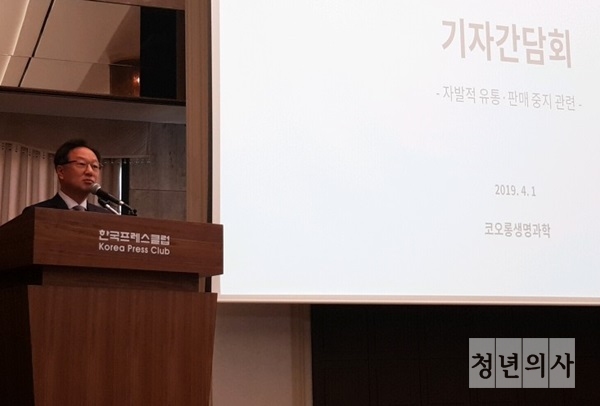Kolon Life Science apologized Monday for “mislabeling” one of its key compositions for Invossa-K Inj., a degenerative arthritis treatment, which had led the firm to suspend the distribution and sales of the treatment voluntarily.

The suspension came after the Ministry of Food and Drug Safety requested Kolon Life Science to discontinue the manufacturing and sales of Invossa-K after a Short Tandem Repeat analysis from Kolon TissueGene, its U.S. subsidiary, revealed the osteoarthritis treatment had a cell line different from the one permitted by the regulatory agency.
The ministry also banned doctors from prescribing this treatment. Currently, the company distributes its product to 443 hospitals and clinics.
After the report, the company shares in the local KOSDAQ market plummeted to 52,700 won ($46.5) as of 3:00 p.m., a drastic 29.92 percent decrease from the previous trading day. Shares of Kolon TissueGene also dropped to 24,150 won, 29.2 percent decrease from the previous trading day.
The suspension of the treatment will further impact the company’s sales this year as the drug is the main cash-cow of the company. Local investment firms, including NH Investment & Securities, had given positive opinions regarding the company’s shares as the company expected to administer over 4,000 doses of the treatment this year.
Considering that a dose of Invossa-K costs 7 million won, if the company reached its goal, Kolon Life Science would have recorded sales of 28 billion won alone with the treatment.
To minimize additional repercussion, the company held an emergency news conference and apologized for “mislabeling” the ingredient and explained the background behind the error.
“The company apologizes and is embarrassed about the mislabeling of the cell line used in Invossa-K and has discontinued manufacturing and sales of the treatment,” Kolon Life Science CEO Lee Woo-suk said. “It was recently confirmed that the transformed cells (TC) that make up the transforming growth factor-beta1 (TGF-beta 1) comes from the kidney-derived 293 cells rather than the cartilage-derived cells.”
Lee added that due to the "technical limitations" in the early 2000s, TissueGene researchers had not been able to accurately identify the cell that had become the basis for Invossa.
“We know that many people are wondering how such a mistake happened. However, the finding happened 17 years ago when TissueGene was conducting early phase of research in a lab in a poor environment,” he said.
Lee also apologized to the government, academia, and businesses who are struggling to grow the bio-industry as well as the patients who need the Invossa-K.
“Since there was much attention toward Invossa-K, the first gene therapy product in Korea, we believe many people would have been disappointed by the news,” he added. “There may be people who doubt Kolon's ethics on this issue, but the company would like to stress that we voluntarily divulged the results as soon as we found out knowing that it would cause huge fallout to our company.”
Lee also emphasized that the composition of Invossa-K remains unchanged and that safety and efficacy of the treatment have not been affected by the results.
“The substance has not changed from clinical trial to market, and Kolon Life Science is confident regarding the safety and efficacy of the drug as Invossa-K’s kidney-derived 293 cells has been consistently used from clinical specimens to commercial products,” Lee said.” The company plans to conduct additional research to reaffirm the consistency of the cells used in Korea.”
However, the company’s mistake may put a damper on its plans to expand the market share of Invossa-K in the global market, industry watchers said.
The company is currently selling the treatment in Hong Kong and Macau, while it also signed an export deal with global pharmaceuticals company Mundipharma to ship products to seven Asian nations, including Singapore and Indonesia, after receiving approval from the countries.
Kolon also signed a contract with China Life Medical Centre to provide Invossa in Hainan, China for five years in 2018.
Both Mundipharma and China Life Medical Centre were not available for immediate comment regarding if the mislabeling of Invossa-K will have an impact on the companies’ contracts with Kolon Life Science.

